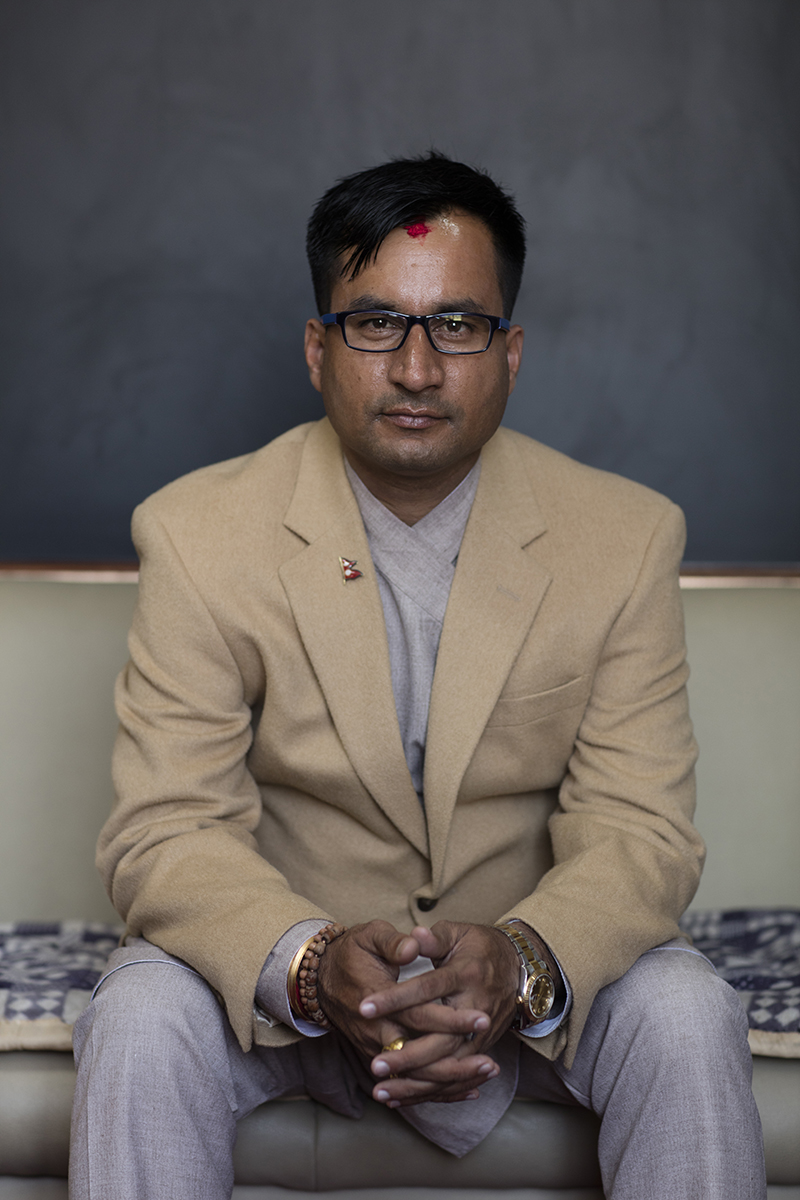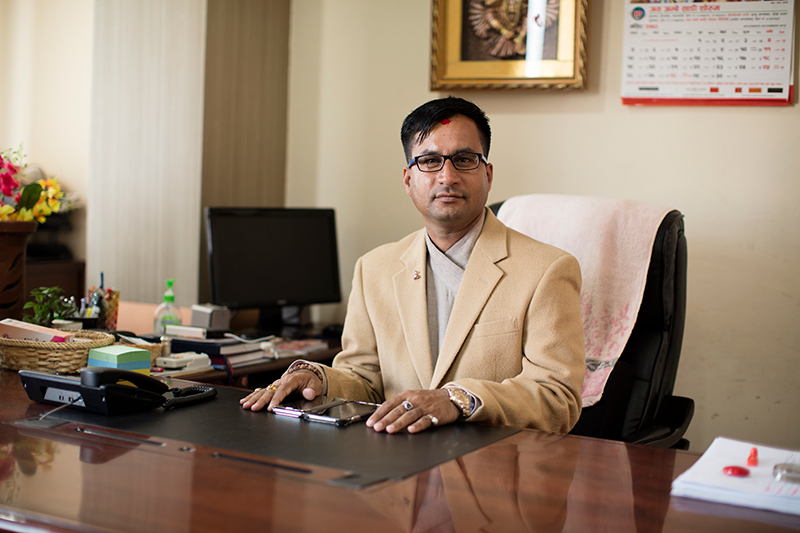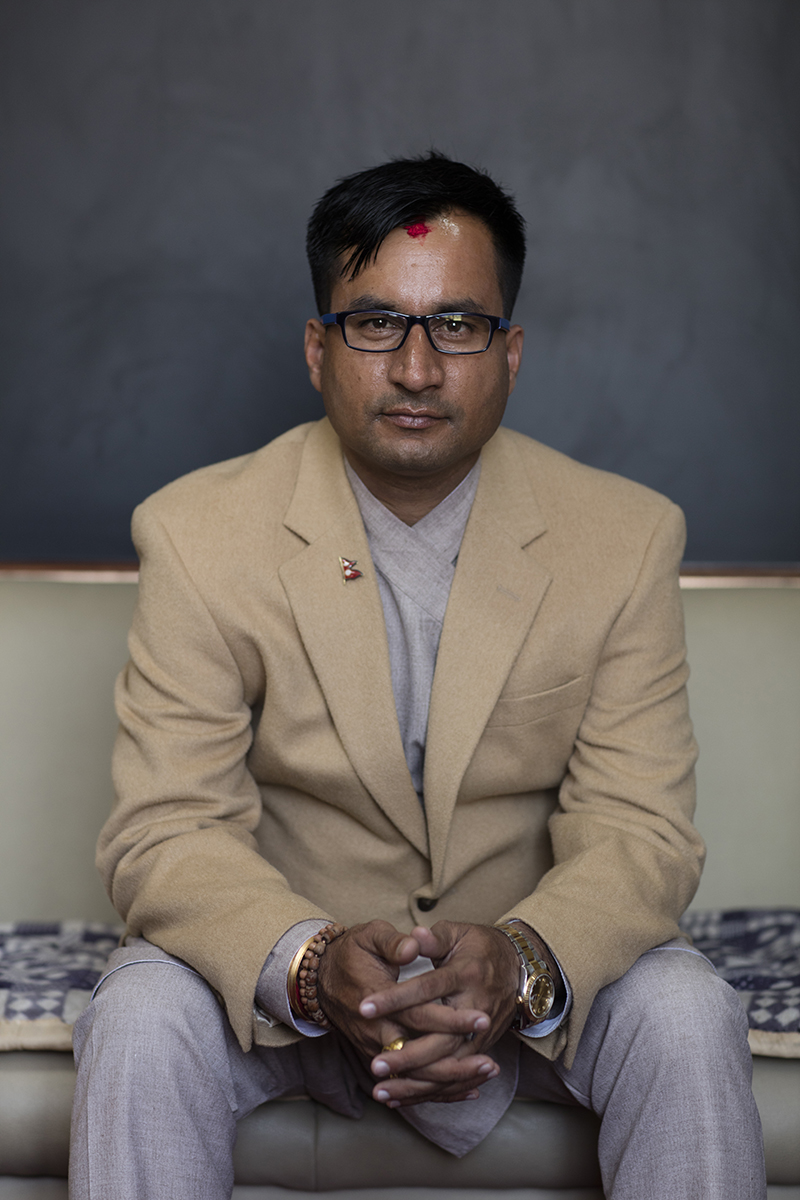
Resilience is key to success in any business. One shouldn’t be scared of losses, and be prepared to lose a few battles in order to win the war,” says Rupesh Kumar Pandey, Managing Director of RP Group. According to him, there will inevitably be obstacles in the way, but if one has determination and destination, no obstacle can stop you.
RP Group is a trading house of 17 companies. The group deals in apparels, electronics, food items and other commodities. The Group is the authorised distributor of numerous brands like Da Milano Italia, Rosso Brunello, Aurelia, W, Wishful and Indian Terrain among others. They also import and deal in women’s ethnic wear from Indian brands across Nepal. In addition, they are the authorised distributor of Indian Terrain with an outlet at Labim Mall, and own and operate the multi-brand Fashion Store Nepal.
Early Life
Pandey was born in Surjaha, a remote village in Parsa district in 1976 AD to Brij Mohan Pandey and Leelawati Devi Pandey. His father was a school teacher, and he grew up in fragile financial circumstances. After SLC, he enrolled for Intermediate in Science at Thakur Ram Multiple Campus in Birgunj and was keen to study Biology dreaming of becoming a doctor. He came to Kathmandu for the first time for the MBBS entrance exam held at Indian Embassy, and was selected for admission with scholarship. Even then he was required to pay Rs 3000 to support his studies in India. “My father used to earn a salary of just Rs 2200, so I couldn’t afford it,” recalls Pandey. And life had bigger plans for him.

Business
Disheartened, Pandey joined the Commerce stream again at Thakur Ram Multiple Campus. His family’s financial situation was getting worse at the time. He used to share rented accommodation with friends in Birgunj, 15 kilometers away from home to be near his campus. Growing up and living in a commercial area of Birgunj where everybody bought products from the bordering Indian city of Raxaul and sold it at profit in Nepal, he started having similar ideas. “I thought to myself, after graduation, my education at most will get me the job of a teacher. With a meagre teachers salary, I won’t be able to uplift my financial status or even ease the condition at home,” he recalls. He only knew that he did not want to spend the rest of his life in the same scarcity. Business could be the only option.
He had an Indian friend in Raxaul who owned a shop selling ladies clothing like sarees and kurtas. “The border was open back then, and I started buying a few sarees and kurtas from Raxaul. I would carry it on my bicycle and distribute it to shops in Birgunj,” says Pandey. He used to pay his friend the money back after the sarees were sold. He started making some profit and was encouraged. Gradually, Pandey expanded his network to start supplying clothing to Hetauda, Chitwan and other places. “I didn’t have an outlet, I worked alone and I supplied sarees and kurtas to shops. I was the first in my family to start a business of any sort,” says Pandey.
Within a year in business, he made a profit of around one million rupees. He still didn’t open shop, instead he hired a few people for the distribution to grow. He made almost 30 per cent profit on a single saree. He only dealt in sarees and kurtas for the first year. The profit of a million rupees motivated him, and he knew that he must make his business grow. He invested profits in land, made a lot of more profit from its sale and accumulated a significant amount of cash. His trading business was still ongoing with the distribution expanding to Pokhara and Kathmandu when he also continued investing in real estate. He then started to diversify. “I started importing rice, pulses, oils and other commodities from India in huge amounts. My area of distribution had grown large, and I was selling both garments and commodities in Kathmandu and other big cities,” he says.
A decade ago he went beyond distribution and opened his first outlet called Jai Ambe Saree Showroom in Indrachowk, New Road. It was very successful as it was cheaper than other outlets. Encouraged, he opened a few other retail outlets even as he continued the wholesale aspect with supplies to more than a hundred shops.

Brands
While travelling abroad for business, he noticed branded shops and got interested. He figured that ths could be good business too. “I found that rich and affluent Nepalis were interested in expensive brands, and I could make better profits if I brought such brands to Nepal,” he shares. He researched many brands and with the help of a friend identified what would work best for Nepal.
He selected two Italian brands, Da Milano Italia for handbags and leather accessories, and Rosso Brunello for men and women’s shoes. Pandey went to India to conclude the franchise deal and finally opened his first branded franchise in Durbar Marg three years ago.
The Future
Pandey has immediate plans of opening outlets of Indian Terrain, Da Milano and Global Desi in Pokhara within two months. “We will be the first international branded outlet in Pokhara,” informs Pandey.
In 2017, Pandey plans to foray into the hospitality business. “I will be opening two outlets of the American chain TGIF, one in Kathmandu and the other in Pokhara. I am also holding talks with people from Starbucks. I will open an outlet of Starbucks as a joint venture in Kathmandu within 2017,” informs Pandey. He also shared his dream of owning a five-star hotel in Nepal in the near future.
Journey
Pandey sold his first saree almost two decades ago, and now has 17 companies and numerous international brands under his Group. He started his trading business with just Rs 5,000, and today, the total capital in his Group is above half billion rupees. He advices new entrepreneurs not to lose hope in the face of adversity. “Business is always about profit and loss, losses are part of the experience. Losses should serve as a lesson, and not act as a deterrent,” he concludes.



-1713949388.jpg)
-1713779693.jpg)
-1712728897.jpg)